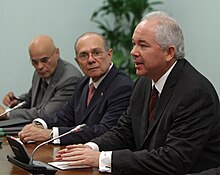Rafael Ramírez (politician)

Rafael Ramírez | |
|---|---|
 Rafael Ramirez (right), February 2010 | |
| Permanent Representative of Venezuela to the United Nations | |
| In office December 2014 – November 28, 2017 | |
| Preceded by | Samuel Moncada |
| Succeeded by | Samuel Moncada |
| Minister of Foreign Affairs of Venezuela | |
| In office 2 September 2014 – 25 December 2014 | |
| President | Nicolás Maduro |
| Preceded by | Elías Jaua |
| Succeeded by | Delcy Rodríguez |
| Personal details | |
| Born | 4 August 1963[1] Pampán, Trujillo State |
| Nationality | Venezuelan, Monégasque |
| Political party | United Socialist Party of Venezuela (PSUV) (2007–2017) Independent (2017–present) |
| Parent | Rafael Darío Ramirez Coronado |
| Relatives | Diego Salazar Carreño, Fidel Ramirez Carreño |
| Residence(s) | New York, United States |
| Alma mater | Central University of Venezuela (MEng) University of Los Andes (BE) |
| Occupation | Engineer, politician |
| Salary | USD 30,000 (Last known in 2008) |
Rafael Darío Ramírez Carreño (born August 4, 1963) is a Venezuelan engineer, politician, and diplomat. He joined the board of Venezuelan state-owned petroleum company PDVSA in 2002 and served as company president from 2004 to 2014. He also served as Venezuela's Minister of Energy from 2002 to 2014. He was the longest-serving cabinet member under President Hugo Chávez. In 2014, he briefly served as Minister of Foreign Affairs, and then subsequently served as Venezuela's Permanent Representative to the United Nations in New York.[2] Ramirez was fired as UN representative by Venezuelan president Nicolas Maduro the evening of November 28, 2017.[3] He confirmed he had "resigned" at the request of Maduro on December 4, 2017.[4]
Life and career
[edit]Ramírez was appointed to lead the energy ministry in July 2002 by Venezuelan President Chávez. Ramirez had been the founding president of Venezuela's "Enagas", the national regulatory agency that was set up to be responsible for establishing the national plan for natural gas production and distribution. Ramírez, a mechanical engineer by his university education, has had wide-ranging experience in the design, development, coordination, and management of engineering projects for the Venezuelan petroleum industry.
Hence, Ramírez was responsible for the design, development, and promotion of national policies for natural gas. Next, he was promoted to the status of Minister of Energy and Mines, and faced the "oil sabotage" of late 2002 and early 2003. The Ministry of Energy and Mines first became Ministry of Energy and Oil in January 2005, and then Ministry for People's Power of Oil and Mining in 2012. On November 20, 2004, Ramírez was selected as the president of the company Petróleos de Venezuela, S.A. (PDVSA), a position that he has held concurrently with that of the Minister of Energy and Petroleum.
Ramírez was moved to the post of Minister of Foreign Affairs on 2 September 2014. After a few months he was instead appointed as Permanent Representative to the United Nations on 26 December 2014. His appointment as Permanent Representative coincided with Venezuela taking a seat on the United Nations Security Council on 1 January 2015.[5] On 31 May 2017, Ramírez was elected as Chair of the Fourth Committee (Special Political and Decolonization).[1] On November 28, 2017 after weeks of differences with Venezuela's government, Ramirez was fired as Venezuela's Permanent Representative to the United Nations in New York.[3] After a week of silence from Ramirez and the Venezuelan UN Mission, on December 4, 2017 he confirmed that he had resigned from the UN post at the request of the Venezuelan president.[4]
Professional career
[edit]- Mechanical engineer from Universidad de los Andes (ULA).[1]
- Master's degree in energy from Universidad Central de Venezuela (UCV).[6]
Sanctions
[edit]The Government of Canada sanctioned Ramírez in November 2017 as being someone who participated in "significant acts of corruption or who have been involved in serious violations of human rights".[7][8]
He is also banned from entering neighboring Colombia.[9] The Colombian government maintains a list of people banned from entering Colombia or subject to expulsion; as of January 2019, the list had 200 people with a "close relationship and support for the Nicolás Maduro regime".[10][9]
See also
[edit]References
[edit]- ^ a b c "Rafael Darío Ramírez Carreño of Venezuela Chair of Fourth Committee". United Nations (Press release). 25 September 2017. BIO/5031*-GA/SPD/630. Retrieved 1 October 2017.
- ^ "New Permanent Representative of Venezuela Presents Credentials". United Nations. 16 January 2015.
- ^ a b "Venezuela removes U.N. representative Ramirez: sources". Reuters. 29 November 2017. Retrieved 2017-11-29.
- ^ a b Vyas, Kejal (2017-12-05). "Venezuela's U.N. Envoy Rafael Ramírez Resigns". Wall Street Journal. ISSN 0099-9660. Retrieved 2017-12-05.
- ^ Andrew Cawthorne, "Venezuela's Maduro moves foreign minister Ramirez to U.N.", Reuters, 26 December 2014.
- ^ "Rafael Ramírez (People's Minister for Energy & Petroleum and PDVSA President)". PDVSA. Retrieved 2013-08-24.
- ^ "Canadá impone sanciones a Maduro, El Aissami, Adán Chávez y Argenis Chávez, entre otros funcionarios". La Patilla (in European Spanish). 3 November 2017. Retrieved 3 November 2017.
- ^ "¡Conócelos! Los 19 funcionarios del gobierno bolivariano sancionados de nuevo por el gobierno de Canadá (lista)". La Patilla (in European Spanish). 3 November 2017. Retrieved 3 November 2017.
- ^ a b "Primera parte de lista de colaboradores de Maduro que no pueden ingresar a Colombia" [First part of list of Maduro collaborators who can not enter Colombia] (in Spanish). RCN Radio. 31 January 2019. Retrieved 13 April 2019.
- ^ "Maduro encabeza lista de 200 venezolanos que no pueden entrar al país" [Maduro tops list of 200 Venezuelans who can not enter the country]. El Tiempo (in Spanish). 30 January 2019. Retrieved 13 April 2019.